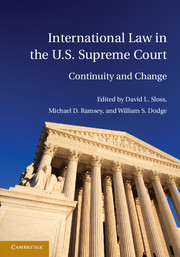Book contents
- Frontmatter
- Contents
- List of Contributors
- Table of Cases
- Acknowledgments
- Introduction
- PART I FROM THE FOUNDING TO THE CIVIL WAR
- PART II FROM THE CIVIL WAR TO THE TURN OF THE CENTURY
- PART III FROM THE TURN OF THE CENTURY TO WORLD WAR II
- PART IV FROM WORLD WAR II TO THE NEW MILLENNIUM
- PART V INTERNATIONAL LAW IN THE U.S. SUPREME COURT IN THE TWENTY-FIRST CENTURY
- V.A TREATIES AFTER 2000
- Main Essay – Medellin and Sanchez-Llamas: Treaties from John Jay to John Roberts
- Response Essay – The Benefits of Avoiding Conflicts between the Constitution and International Law
- Response Essay – Medellin and the Passive Vices
- V.B CUSTOMARY INTERNATIONAL LAW AFTER 2000
- V.C INTERNATIONAL LAW AND CONSTITUTIONAL INTERPRETATION AFTER 2000
- V.D INTERNATIONAL LAW AND STATUTORY INTERPRETATION AFTER 2000
- V.E INTERNATIONAL LAW AND THE WAR ON TERROR
- VI CONCLUSION
- Index
- References
Response Essay – Medellin and the Passive Vices
Published online by Cambridge University Press: 05 July 2011
- Frontmatter
- Contents
- List of Contributors
- Table of Cases
- Acknowledgments
- Introduction
- PART I FROM THE FOUNDING TO THE CIVIL WAR
- PART II FROM THE CIVIL WAR TO THE TURN OF THE CENTURY
- PART III FROM THE TURN OF THE CENTURY TO WORLD WAR II
- PART IV FROM WORLD WAR II TO THE NEW MILLENNIUM
- PART V INTERNATIONAL LAW IN THE U.S. SUPREME COURT IN THE TWENTY-FIRST CENTURY
- V.A TREATIES AFTER 2000
- Main Essay – Medellin and Sanchez-Llamas: Treaties from John Jay to John Roberts
- Response Essay – The Benefits of Avoiding Conflicts between the Constitution and International Law
- Response Essay – Medellin and the Passive Vices
- V.B CUSTOMARY INTERNATIONAL LAW AFTER 2000
- V.C INTERNATIONAL LAW AND CONSTITUTIONAL INTERPRETATION AFTER 2000
- V.D INTERNATIONAL LAW AND STATUTORY INTERPRETATION AFTER 2000
- V.E INTERNATIONAL LAW AND THE WAR ON TERROR
- VI CONCLUSION
- Index
- References
Summary
In a thoughtful and insightful essay, Professor Lori Damrosch contends that the Supreme Court decisions in Medellin v. Texas and Sanchez-Llamas v. Oregon represent a significant departure from earlier precedents. I largely agree with Professor Damrosch's analysis. However, I contend that Medellin is a more radical departure from precedent than commentators have previously acknowledged.
Medellin is fundamentally at odds with a traditional understanding of procedural due process whose roots can be traced to the Magna Carta. According to the traditional view, when the state threatens to impose criminal sanctions on someone, and that person alleges that the threatened sanction is unlawful, a judicial hearing on the merits of the argument is required, provided the argument is raised at the first available opportunity in accordance with established procedural rules. Medellín argued that Texas threatened to subject him to an unlawful criminal sanction. He raised that argument at the first opportunity in accordance with Texas procedural law. Even so, Texas executed him without providing a judicial hearing on the merits of his argument. In Medellin, the Court endorsed this violation of the petitioner's procedural due process rights.
Medellin is best understood as an outgrowth of the Court's embrace of “the passive virtues,” in Alexander Bickel's apt phrase. The main lesson of Medellin is that unbridled enthusiasm for judicial passivity blinded the Court to what Gerald Gunther called “the subtle vices of the passive virtues.
- Type
- Chapter
- Information
- International Law in the U.S. Supreme Court , pp. 472 - 478Publisher: Cambridge University PressPrint publication year: 2011

